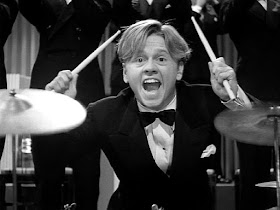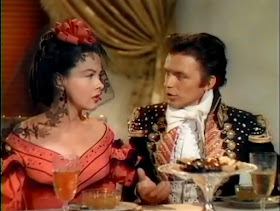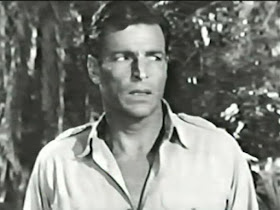
Here's a round up of some new and/or recent films that were of interest but didn't necessarily cry out for lengthier reviews. This way I can focus most of my attention on the older films that are my meat and potatoes, so to speak! I will be doing this round-up periodically.
Firewall (2006). Director: Richard Loncraine. Harrison Ford stars as a man whose family is held hostage by a group of criminals who want him to help them rob the bank where he works. Things get pretty out of control in an exciting climax. Nothing that new here, but entertaining enough, and well-acted; Ford is quite good. **1/2.
The Hole (2009) Director: Joe Dante. Teenagers discover that there's something very strange under a trap door in the basement. Dead people and demons keep coming up and/or disappearing. Descending into the hole, the kids find themselves in a strange new world. **1/2.
Last Will (2011). Director: Brent Huff. Tatum O'Neal stars as a woman who marries a wealthy older man (Tom Berenger) but comes afoul of her two greedy and highly malevolent brothers-in-law. This is minor but entertaining, with a vivid performance from Patrick Muldoon and a nifty, effective wind-up. ***.
Killer Mermaid (aka
Nymph/2014). Director: Milan Todorovic. A group of vacationers come afoul of a beautiful but deadly killer mermaid in the Greek isles. Franco Nero, light years from
Camelot, is the only name member of the cast. Some good bits, but not memorable. **.
The Invitation (2014) Director: Karyn Kusama
. A man brings his new girlfriend to a party hosted by his ex-wife and her new boyfriend, both of whom try to indoctrinate them and other guests into a cult. Failing that ... The film is well-acted enough to hold the attention, but it has little suspense or tension until the final moments, when the abrupt change in tone is almost comical. **1/2.
Indigenous (2014). Director: Alistair Orr. Young
tourists are taken to visit a beautiful spot in the Peruvian jungle, but come afoul of silently creeping, definitely creepy, very fast-moving, and decidedly carnivorous humanoid creatures. Once this gets going,
Indigenous is a well-made horror film with some disquieting and effective sequences. ***.
Krampus (2015)
Director: Michael Dougherty.
Krampus is about a family besieged by demons, including malevolent clowns and living ginger bread cookies, at an Xmas celebration because somebody doesn't have the proper Christmas spirit. Or something like that. It's hard to figure out if
Krampus is a horror film or a comedy, but it doesn't work as either. Conchata Ferrell, doing her fat old chick with attitude shtick, headlines a cast of unknowns, some of whom are effective, but the film is not. **.
Kill Your Friends (2015). Director: Owen Harris. A darkly amusing, graphic dissection of the ludicrous late 90's British music business focuses on a handsome sociopath (Nicholas Hoult) who resorts to murder to get ahead.
Kill Your Friends is entertaining and well-acted, but the basic premise isn't at all original. The script allows for sexist and homophobic "frat boy" humor because the protagonist who makes these remarks is a bad guy, but one senses the filmmakers want to have their cake and eat it too. **1/2.
10 Cloverfield Lane (2016). Director: Dan Trachtenberg. John Goodman stars in this interesting and suspenseful thriller about a man who takes a young woman to a bunker and tells her that everyone is dead and the world outside is contaminated. Is the man nuts, or does he know even more than he's telling? A sort of sequel to
Cloverfield that takes its own direction to arrive at its point, which may confuse many viewers. But the film is well-acted and quite entertaining. ***.
The Hatching (2016). Writer/director: Michael Anderson. A small village in Somerset is beset by both killer crocodiles and serial killers. This black comedy starts well, is well-produced, photographed, and acted, but deteriorates, becoming a bit too stupid and tedious. I'm sure some will see it as having quirky charm, but it's all kind of familiar, and some of the annoying characters don't wear very well. There are several climaxes but not the one this picture needs. A more exciting musical score might have helped. **1/2.
Justice League vs Teen Titans (2016)
is a disappointing animated feature which involves the Justice League and their teen counterparts in a battle with Trigon the Terrible. This is far below the level of the entertaining stories about Trigon, and the two super-groups who battled him and each other, that appeared in the
New Teen Titans comic years ago. This movie, besides having a horrible kind of rock video sequence with dreadful music, incorporates the somehow trendy and rather annoying character of ten-year-old Damian Wayne. **.
London Has Fallen (2016). Director: Babak Najafi. In this sequel to
Olympus Has Fallen terrorist attacks break out in London as the U.S. President and assorted dignitaries attend a funeral for the murdered prime minister. An agent played by Gerard Butler tries to keep the president alive amid chaos. This is fairly standard action stuff and nothing more. **.




























